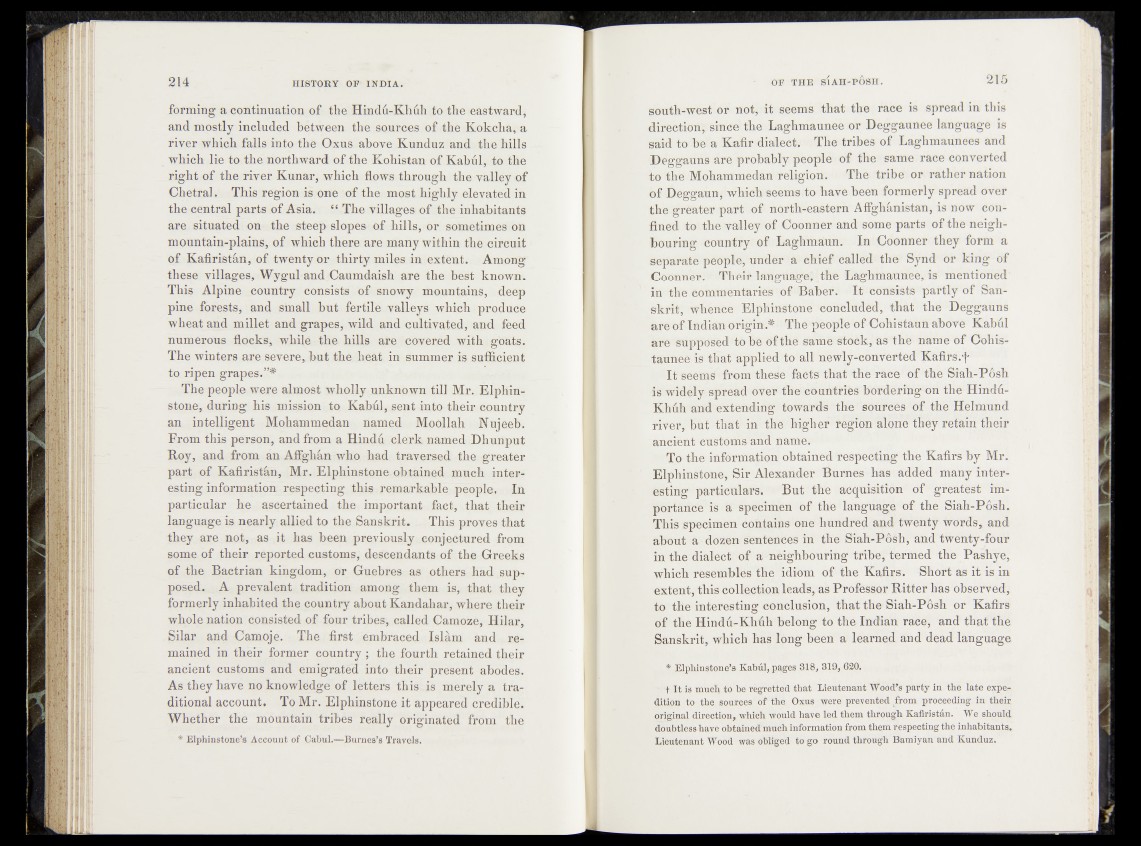
forming a continuation of the Hindfr-Khdh Jo the eastward,
and mostly included between the sources of the Kokcha, a
river which falls into the Qxus above Kunduz and the hills
which lie to the northward of the Kohistan of Kabul* to the
right of the fiver Kunar, which flows through the valley of
Chetral. This region is one ! of the most highly elevated in
the central parts of Asia. “ The villages of the inhabitants
are situated on the steep slopes of hills* or sometimes on
m ountain-plains, of which there are many within the circuit
of Kafiristhn, of twenty or thirty miles in »extent. Among*
these villages, Wygul and Caumdaish are the best known.
This Alpine „country consists of snowy mountains, deep
pine forests, and small but fertile valleys which produce
wheat and millet and grapes, wild and cultivated,
numerous flocks, while the hills are covered with goats,.
The winters are (severe,, but the heat in summer is sufficient
to ripen grapes.”*
The people were almost wholly unknown till Mr..Eiphim-
stone, during his mission to Kabul, sent into their conjfetrjjjF
an intelligent Mohammedan named Moollah Nujeeb.
From this person, and from a Hindu clerk named Dhunput
Hoy, and from an Affghhn who had traversed the greater
part of Kafiristhn, Mr. Elphinstone.obtained much interf
esting information respecting this remarkable ~pebple. Tn
particular he ascertained the important fact, that their
language is nearly allied to the Sanskrit. ^ This proves that
they are not, as it has been previously conjectured from
some of their reported customs, descendants of the Greeks
of the Bactrian kingdom, or Guebres as others had supposed.
A prevalent tradition among them is, that they
formerly inhabited the country about Kandahar, where their
whole nation consisted of four tribes, called Camoze, Hilar,
Silar and Camoje, The first embraced Islam and remained
Ip their former country ; the fourth retained their
ancient customs and emigrated into their present abodes.
As they have no knowledge of letters this .is merely a traditional
account. To Mr. Elphinstone it appeared credible.
Whether the mountain tribes really originated from the
* Elphinstone’s Account of Cabul.—Burnes’s Travels.
South-west or not, it seems that the race is spread in this
direction* since’1 the Laghmaunee or Deggaunee language is
said to hèöa Kafir dialeetr The tribes of Laghmaunees and
©eggauns are probably people of the same race converted
to '-the Mohammedan religioii. The tribe or rather nation
of De'g'gaun, whicb-seemsjto have been formerly spread over
the greater part of north-eastern Affghhnistan, is now confined
to the valleyyrf Goonner andrsome parts of the neighbouring
c© u ^ In- Goonner they form a
separate peopÜe|^IÉidèr a chief called the*' Synd or king of
CoOnner. Their langUê^éj »the Laghmaunee, is mentioned
in the commentaries'of-'Baber. If'ChifelstS- partly of Sanskrit,
whence5' ElphinstOiVe ^©deluded, that ' the Deggauns
ai^of Indian ttitfill.* The^èopTé o^GbMMatin above Kabffi
Ute suppo&êdNtö bb of the samb stock,' as dbi^n&me of Cobis-
taunebi&that applied to all newty^bnverted Kafir&.f
' ' It seem/’ frOiii'these facts that the race of the'Sïah-Pösh
is widely spread over th e cö uPtFibs1 bordering ott the Hinefd^
Khüh and extending towards the soiirées^f the Helimund
river, but'that in- the higher region altpre they retain their
ancient customs and namte^w
To the information obtained respecting the Kafirs by Mr.
Elphinstone, Sir Alexander Burnes has added many' interesting
particulars. But the -acquisitionaiöf^^rfedthst’4Ö®
|>brt&n!cfe"is a specimen of the*language of the Siah-Posh.,
This specimen contains:one hundred and twenty words, and
about a-dozen sentences in A^Sfah-P6sh,"and twenty-four
in the dialect of a neighbouring tribe, termed the Pashyè»
which resembles the idiom of the Kafirs.1 *Short as it is in
extent, this collection leads, as Professor Ritter has óbsefved,
to the interesting conclusion, that the Siah-Posh or Kafirs
of the Hindd-Khdh belong to the Indian race, and that the
Sanskrit, which has long been a learned and dead language
* Elphinstone’s Kabul, pages 318, 819, 620.
* I t is much to-be regretted that Lieutenant Wood’s party in the late exptk
dition to the sources 'o f the Oxus were prevented |rom proceeding; in them
original direction, whfch would have led them through Kafiristan. We should,
doubtless have obtained'much. information from them respecting the inhabitants*
Lieutenant Wood was obliged to go round through Bamiyari and &unduz.